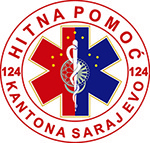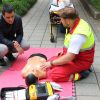Mr.sci.med.dr Adem Zalihić, director of JU ZHMP KS, for Klix portal:
"We need to help people in pain, but our
the job is much more serious ”
Since taking over the position of Emergency Director of Sarajevo Canton, Adem Zalihić assures citizens that they can be proud of everything that this health institution provides, and his greatest wish, he tells us, is that the Ambulance does what it is responsible for and that citizens are healthy. more aware
At the beginning of the conversation, Zalihić points out that the KS Emergency Service differs from other institutions for providing emergency medical care in our country, both in terms of work organization and equipment and experience of workers.
"KS ambulance has a future and perspective only if we provide young people with affirmation. We want to keep young and quality people ", says Zalihić.
It is not difficult to assume that people from the Emergency Department often went to other health care institutions or other countries. Today the situation is a little different. Zalihić claims that he can say with reservations that the doctors in the KS Ambulance are satisfied and solidly paid for their work.
"We want to give people the opportunity for comprehensive education when it comes to emergency medicine. Our people have already been guests at several important scientific gatherings. We have created a prestigious educational center that provides modern conditions for education just to guide young people. Among the ten young people we are training, there may be an expert who will be mentioned tomorrow, such as Dr. Silva Rizvanbegović, after whom we named the center, ”Zalihić told us.
Emergency physicians in KS treat approximately 400 patients a day, and sometimes more than 550 patients on weekends. For the sake of comparison, the Ambulance in Belgrade, which has four times more inhabitants than the capital of BiH, treats approximately 700 to 800 patients a day.
"KS ambulance is extremely busy. I would not select who is to blame for that now, but my wish is for us to move away from the geriatric service or the palliative service. The authorities and those responsible must find a solution for providing these people with adequate help, but I think that this is not the job of the Ambulance, this is not the case anywhere in the world. For example, we go to at least 10-15 locations every day where cancer patients need help. Patients like this deserve care, but if you are treating someone with cancer, and at that time someone fell off a scaffold, suffered a car accident, heart failure, stroke, appendicitis rupture and the like, we need to have priorities. If we give preference to the profession, then we will very easily come to the conclusion of what the ambulance should do. People don't understand what an ambulance is. It is an outpatient provision of emergency medical care. We have to cover the ground. We are trying to organize ourselves even better, but so far we have managed to develop an exceptional system. The citizens of Sarajevo Canton can certainly be proud because something like this does not exist everywhere in BiH. Everyone is jealous of us because other parts of BiH do not have such an ambulance ", Zalihić points out.
However, what makes it difficult for emergency physicians to work, not only in Sarajevo, but throughout BiH, is the low awareness of citizens about the basics of resuscitation and first aid. As Zalihić admits, everyone is used to calling an ambulance and just waiting for it to come.
"Our greatest enemy is time. When a man’s heart stops, profession and science say you have a maximum of five minutes to revive. You have the greatest opportunity to help a person in the first minute and then it falls sharply, in the second minute much less and after only five minutes it is difficult to bring someone back to life. Citizens, unfortunately, do not know the basics of providing assistance in such situations. I don't blame them, but we try to get as many citizens as possible to go through the basics of resuscitation or through BLS (Basic Life Support) education ", Zalihić tells us.
In America, for example, it is the obligation of all students to go through BLS education. Zalihić and his team are working on a campaign to make it a practice in our country as well.
“People feel proud, especially teenagers, when you explain to them that you can really help someone. That is a direction for us in the future. Everyone will agree that it is important that you can help someone, and being able and not knowing it is very bad. People are waiting for the ambulance, they are shouting on the phone… But well, we are coming and we will come. The dispatcher wants to give advice to those who are at the scene to do a few useful things, but we do not always find good cooperation ", adds Zalihić.
A doctor sitting in the dispatch center, explains Zalihić, can receive up to 20 calls in three minutes. He has to decide where to send help first, while everyone wants him to come to them first.
"People are not interested in anything, everyone wants help. I did that job and I have countless cases where I wished I had never gone to the Ambulance. You decide on other people's lives and everyone is in a difficult situation ", adds Zalihić.
Fortunately, KS Ambulance has an excellent capacity of fleet, doctors and equipment. Recently, the Government of KS approved financial resources for the adaptation and rehabilitation of the ambulance facility.
Zalihić tells us that a representative of the European Bank for Reconstruction and Development (EBRD) visited the KS Ambulance last month and expressed great satisfaction with the work of this institution.
When it comes to educating citizens, Zalihić expressed great satisfaction that the capital of BiH will soon receive six new automatic defibrillators or AED resuscitation devices. The City of Sarajevo and the mayors of all Sarajevo municipalities have recognized the importance of installing these devices in locations where they are needed, and Zalihić emphasizes that with them, literally every citizen can save someone's life.
"It is very important for a person who can start reviving another person, that is, to 'buy' some time for us. It is an immeasurable benefit, both for the individual and for society as a whole. I must have lost 200 people on my hands in my career so far. I know something could have been done there. Ever since I came to this position, my intention has been to move away from giving pain injections. People who are in pain should also be helped, but that is not the job of an ambulance. Our job is much more serious ", Zalihić pointed out.
Today, 80 doctors work in the KS Ambulance, from interns to full-time employees. The fact that they were among the first to install a pacemaker in the field speaks volumes about their expertise.




